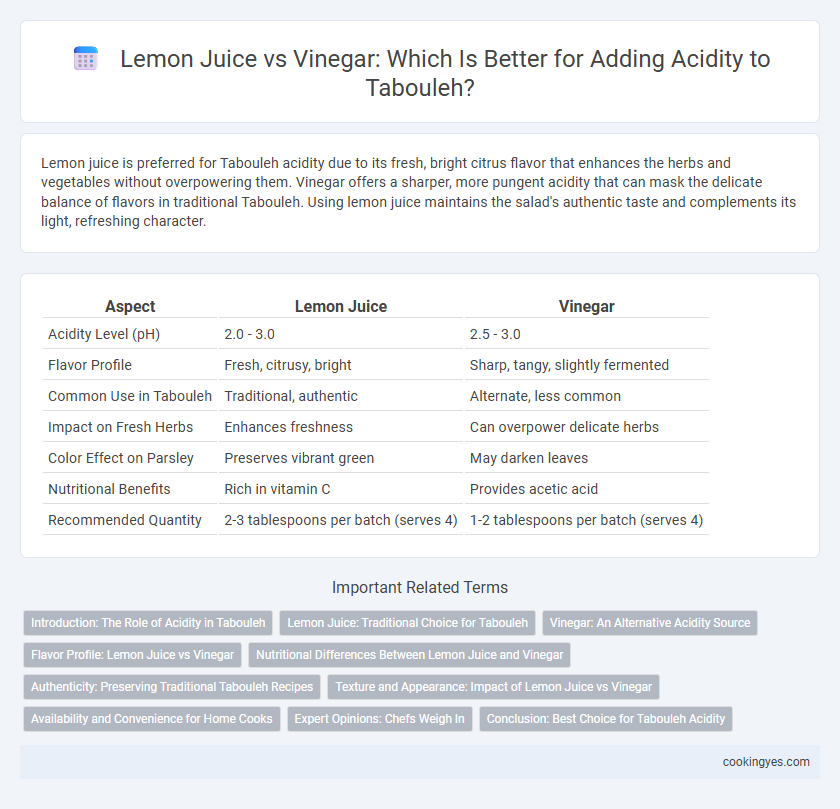Lemon juice is preferred for Tabouleh acidity due to its fresh, bright citrus flavor that enhances the herbs and vegetables without overpowering them. Vinegar offers a sharper, more pungent acidity that can mask the delicate balance of flavors in traditional Tabouleh. Using lemon juice maintains the salad's authentic taste and complements its light, refreshing character.
Table of Comparison
| Aspect | Lemon Juice | Vinegar |
|---|---|---|
| Acidity Level (pH) | 2.0 - 3.0 | 2.5 - 3.0 |
| Flavor Profile | Fresh, citrusy, bright | Sharp, tangy, slightly fermented |
| Common Use in Tabouleh | Traditional, authentic | Alternate, less common |
| Impact on Fresh Herbs | Enhances freshness | Can overpower delicate herbs |
| Color Effect on Parsley | Preserves vibrant green | May darken leaves |
| Nutritional Benefits | Rich in vitamin C | Provides acetic acid |
| Recommended Quantity | 2-3 tablespoons per batch (serves 4) | 1-2 tablespoons per batch (serves 4) |
Introduction: The Role of Acidity in Tabouleh
Acidity in tabouleh is crucial for balancing the fresh flavors of parsley, bulgur, and tomatoes while enhancing the overall taste profile. Lemon juice offers a bright, citrusy tang that complements the herbaceous ingredients, whereas vinegar provides a sharper, more pungent acidity that can slightly alter the traditional flavor. Choosing between lemon juice and vinegar ultimately influences the dish's authenticity and the harmony of its vibrant, refreshing character.
Lemon Juice: Traditional Choice for Tabouleh
Lemon juice remains the traditional choice for tabouleh acidity due to its fresh, bright flavor that enhances the salad's herbal notes and balances the ingredients. Its natural citrus acidity complements the parsley, mint, and tomatoes more harmoniously than vinegar, creating the authentic, refreshing taste essential to classic tabouleh. Using lemon juice also maintains the dish's Mediterranean roots, preserving its cultural and culinary integrity.
Vinegar: An Alternative Acidity Source
Vinegar serves as a distinctive alternative acidity source in tabouleh, offering a sharper and slightly sweeter taste compared to lemon juice. Its acetic acid content enhances the salad's freshness while balancing the earthy flavors of bulgur, parsley, and tomatoes. Using vinegar can provide a unique tanginess that complements the traditional Middle Eastern herbs and spices in tabouleh.
Flavor Profile: Lemon Juice vs Vinegar
Lemon juice delivers a bright, fresh, and citrusy acidity that enhances the herbal notes of parsley and mint in tabouleh, creating a vibrant flavor profile. Vinegar, often white or apple cider, contributes a sharper, more pungent acidity that can introduce a tangy depth but may overpower the delicate balance of ingredients. Choosing lemon juice typically results in a more refreshing and traditional taste, while vinegar offers a bolder, acid-forward alternative that alters the dish's classic freshness.
Nutritional Differences Between Lemon Juice and Vinegar
Lemon juice provides vitamin C and antioxidants essential for immune support and skin health, while vinegar primarily offers acetic acid that aids digestion and regulates blood sugar levels. Lemon juice contains fewer calories and added nutrients like potassium and folate, making it a more nutrient-dense option for Tabouleh acidity. Vinegar's low pH enhances flavor without significant vitamins but promotes gut health by supporting beneficial bacteria growth.
Authenticity: Preserving Traditional Tabouleh Recipes
Lemon juice is traditionally favored in authentic tabouleh recipes for its bright, fresh acidity that enhances the vibrant flavors of parsley, bulgur, and mint. Vinegar, while acidic, introduces a sharper, more pungent taste that can overpower the delicate balance of ingredients characteristic of classic Levantine tabouleh. Preserving the use of lemon juice ensures the dish remains true to its cultural roots and maintains the signature refreshing profile central to its authenticity.
Texture and Appearance: Impact of Lemon Juice vs Vinegar
Lemon juice enhances tabouleh's texture by slightly softening the bulgur while maintaining a fresh, vibrant appearance with a bright, natural yellow hue. Vinegar, particularly white or apple cider, can create a sharper acidity that may cause the parsley and tomatoes to appear duller and alters the bulgur's firmness, resulting in a denser texture. Choosing lemon juice over vinegar preserves the salad's traditional crispness and colorful presentation, crucial for authentic tabouleh appeal.
Availability and Convenience for Home Cooks
Lemon juice is widely favored in tabouleh recipes due to its fresh, bright acidity and easy availability in most home kitchens or local markets. Vinegar, while also acidic, may require a specific type such as white wine or apple cider vinegar to mimic a similar flavor profile, which is less common for everyday home cooks. Lemon juice's natural citrus notes simplify seasoning, making it a convenient choice for balancing tabouleh's fresh ingredients without additional preparation.
Expert Opinions: Chefs Weigh In
Chefs specializing in Middle Eastern cuisine often prefer lemon juice over vinegar for tabouleh due to its fresh, bright acidity that complements the parsley and bulgur without overpowering other ingredients. Expert opinions highlight that lemon juice enhances the herbaceous flavor profile, providing a natural balance that vinegar's sharper tang cannot replicate. Culinary professionals emphasize that the choice of acidity significantly impacts the dish's authenticity and overall taste experience.
Conclusion: Best Choice for Tabouleh Acidity
Lemon juice is the best choice for tabouleh acidity as it provides a fresh, bright citrus flavor that enhances the dish's vibrant ingredients. Unlike vinegar, lemon juice complements the parsley and bulgur without overpowering their natural taste. The natural acidity and subtle fruitiness of lemon juice balance the flavors perfectly, maintaining the traditional essence of tabouleh.
Lemon Juice vs Vinegar for Tabouleh acidity Infographic

 cookingyes.com
cookingyes.com